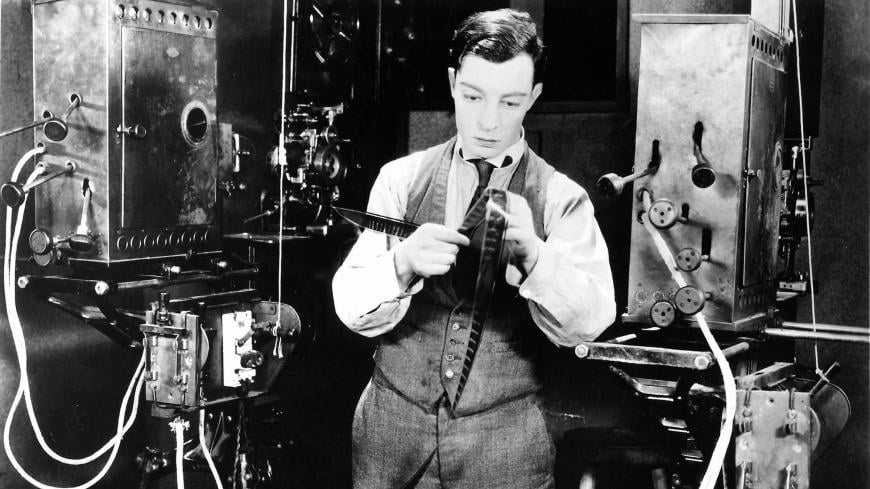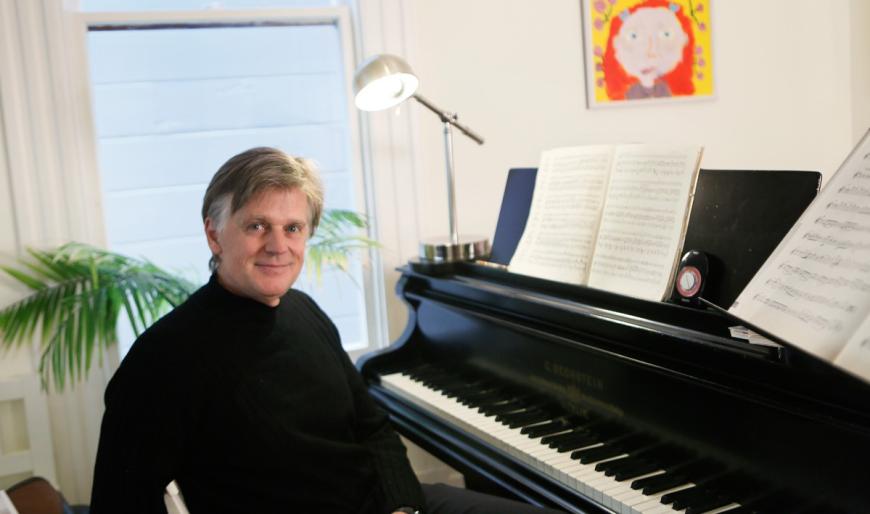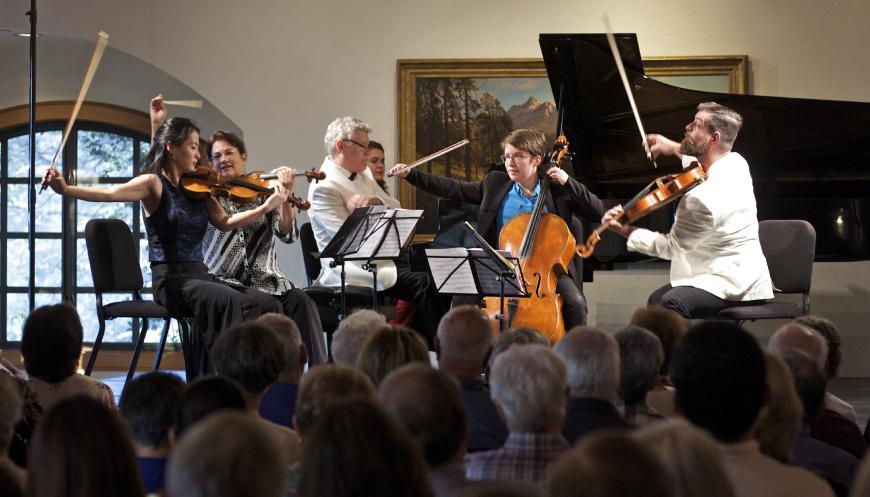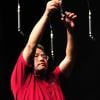
“There is an old proverb which says: Don’t try to do two things at once and expect to do justice to both.”
This is the title card you’ll see at the beginning of Buster Keaton’s 1924 film Sherlock Jr. And you’ll be seeing that silent movie in an unexpected setting: as part of the 28th-annual season of Music in the Vineyards, opening on Aug. 3 and extending over three weeks across the vineyards and performance venues of Napa Valley.
MITV will make a point of belying the proverb’s caveat. As always, it will showcase chamber music, with a handful of top-flight quartets and contributing soloists. But in the process, it will also, as its brochure states, respond to “the turbulent 2020s” by featuring composers underrepresented because of their gender and race and “pieces for all who have suffered and lost loved ones during these past few years.”

Sherlock Jr. shows up as another instance of the festival’s variegated offerings, on Aug. 20 at the St. Helena Performing Arts Center. The evening of three silent films is set to music by Stephen Prutsman and accompanied by the composer (on piano) in collaboration with the Telegraph Quartet and flutist Tara Helen O’Connor.
Prutsman, brought up in Los Angeles and now a resident of San Francisco’s Haight-Ashbury, is himself a master of many things. Trained classically at UCLA and the Peabody Conservatory, he began his performing career playing in jazz clubs and appearing on a nationally syndicated fundamentalist televangelist program, The King Is Coming, though he didn’t subscribe to the faith.
Relocating to the Bay Area, Prutsman was recruited by the similarly eclectic Kronos Quartet, for whom he’s created over 40 arrangements and compositions. “Everything I did with them was a real treat,” attests Prutsman in a phone interview. “I arranged music for their program with Tom Waits, and an arrangement of Jimi Hendrix’s arrangement of ‘The Star-Spangled Banner.’ And we developed music with interesting musicians from Afghanistan, Mali, and Turkey, projects with people who know music as an oral rather than a written tradition, which meant I had to put in interesting ways to signal back and forth [between the Quartet and their international guests].” His interest in world music led to separate work with Asha Bhosle and Sigur Rós, and he contributed to the Silk Road Project.
A couple of decades of service to The Saint Paul Chamber Orchestra, mostly as a composer, connected Prutsman with violinist Daria Tedeschi Adams and her violist husband Michael Adams, artistic directors of MITV. “I think Daria had seen some of my silent movie shows, and she and Michael said, ‘Let’s do an evening of them,’” recounts the composer. He’d first fallen in love with the silent comedies of Charlie Chaplin and Laurel and Hardy as a kid, when they were screened at a playhouse in L.A. “If I recall, they had piped-in music. They’d just play old recordings. The music wasn’t necessarily tailored for the action you’d see on the screen.”
Prutsman points out that “in the old days, when some of these films premiered and the studio would mail the reels out to the theaters, the reels would arrive on a Monday, and with them the studio might include a sheet of snippets of tunes suggested for the organist [at each theater] to improvise on. I heard that people would intentionally not come on a Tuesday, when the screenings would start, because the organist was just getting to know stuff. By Friday or Saturday, he or she would be well versed in the movie.

“Most of the time there weren’t specific scores for movies,” Prutsman continues, “with the exception of late Chaplin, where he himself participated in making music, and some of the big Soviet blockbusters, like Battleship Potemkin.” He owns a book of “cues” which were additional reference points for accompanists. “You’d see Mendelssohn’s Rondo Capriccioso there, which might work for a scene with an airplane. For a battle, you’d have some Beethoven thrown in, or Chopin’s ‘Funeral March’ for a cemetery scene.”
Prutsman hadn’t thought about scoring for silents himself “until about 20 years ago, when there was a chamber music festival in Rockport, Maine, and they said, ‘Do you want to write a piece for this film?’ and I did that for them a few times. From then till now, I’ve scored about 13 films.”
On the MITV program, aside from the 45-minute Sherlock Jr., are two shorter films, A Trip to the Moon, directed by Frenchman Georges Méliès in 1902, and Russian director Władysław Starewicz’s The Cameraman’s Revenge, from 1912. “I’ve never encountered specific [musical] cues for these films,” says Prutsman, “which means either they’re lost, or they were never made.”
He’s arranged A Trip to the Moon, a sort of surrealistic sci-fi tale, for piano and flute. “Tara Helen O’Connor is the greatest flute player on this planet,” attests Prutsman, “and she’ll get on stage with five different flutes and jump back and forth between them. For my score I have some stuff without a tonal center, and once in a while I throw in a musical joke, like a quote from a famous flute sonata.”

The Cameraman’s Revenge “is a bizarre little flick where the director used stop-motion animation with dead bugs, for a humorous story line with the bugs walking around, getting in fights, and falling in love. Since it was made in Russia during a particular period, I gravitated towards an almost Soviet-like language and the carnival-like atmosphere of some of Shostakovich’s writing.”
The composer also factors period elements into his score for the featured Sherlock Jr., which, “like just about all the Keaton films, is a melodrama, with a love story. There’ll be a lot of Charleston, ragtime, and swing. And I always include a quote from Schoenberg because I’m a Schoenberg fan. I’ll pick out one of his [12-tone] rows and hide it in there, usually where there’s spooky stuff. I’ve only had two occasions where somebody from the audience has come back and said, ‘Isn’t that a row from Schoenberg?’ And I was thrilled! Usually it comes and goes, and nobody picks up on it, which is fine.”
The Telegraph Quartet will partner with Prutsman on the Russian and Keaton films. “They’re pros, and I’m looking forward to this,” he says. “Everybody will be working. The music doesn’t stop for 45 minutes [on Sherlock Jr.], and it’s not like anywhere they’ll need to wait around for the piano to get done. But it’s being put together quickly — there’ll only be a couple of rehearsals — so when the cello is cast for 20 bars, I’ll look over, I’ll give visual cues.”
Prutsman’s autistic son Alexander “is the biggest theme of my life now,” and the composer has been instrumental in creating artistic and recreational environments for autistic children and their families. But he stays active in his various professional functions. “Last week, I gave a program at a piano festival in Cincinnati, which I called ‘Bach and Forth.’ I had little pieces of Bach, juxtaposed with an outline of Western music, from Rameau to Schoenberg. The second half was Bach and everything else, with everything from Rwandan traditional music to stuff from South Asia and Walter Hawkins gospel and Charlie Parker. I love seeking new relationships in music.”
He’s also been teaching piano at Stanford, writing a piece for flute and string quartet for New Mexico’s Music From Angel Fire festival (where he’s currently composer-in-residence), arranging Duke Ellington for The Saint Paul Chamber Orchestra, and continuing to score one feature-length silent film each year.
Prutsman and the silents will help close out the final week of this year’s MITV, which will also feature (alongside the chamber music) a world premiere by pianist Michael Brown and numerous lectures, meet-and-greets, and public presentations throughout Napa Valley.




